Sabine Agnew-Steldinger | Co-founder Magnetic Fidelity and Agnew Analog Reference Instruments
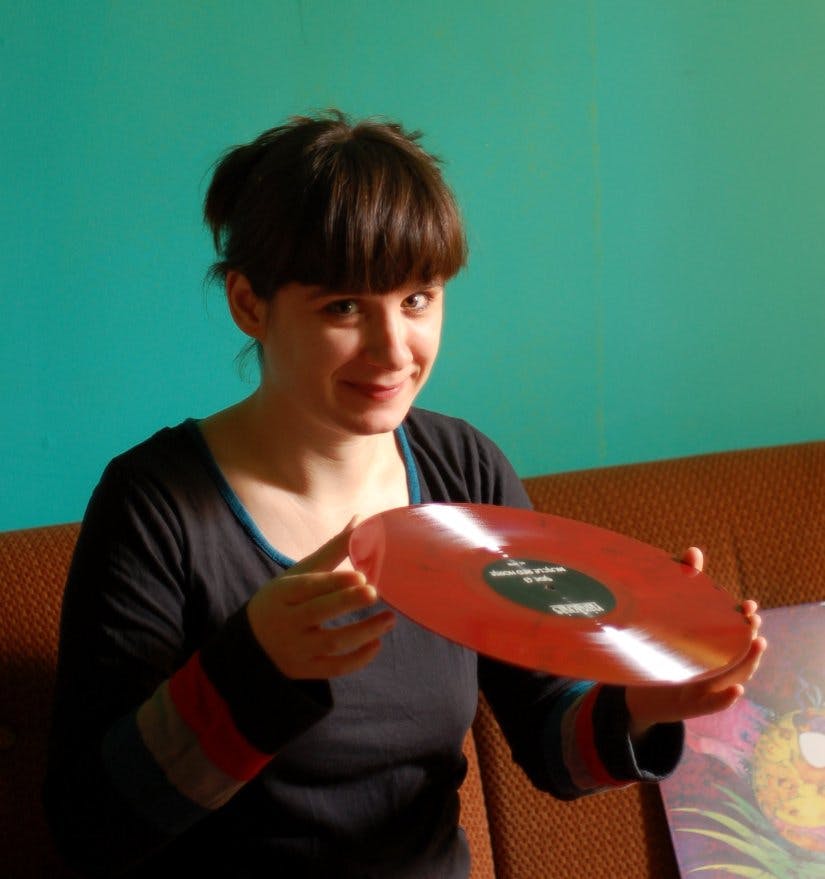
Meet Sabine who is the co-founder of Magnetic Fidelity and Agnew Analog Reference Instruments which are two companies closely linked. Magnetic Fidelity started in 2014 as an analog mastering facility full of custom high end vacuum tube equipment which handled some direct-to-master recordings with bands from Greece and several other countries. Two Greek film makers even made a documentary film about them in 2016. “There you can see us still having bunnies and chicken in the garden, back then the studio and workshops were still pretty much under construction”
Sabine was part of introducing the first independent disk mastering studio in Greece, and working on several highly regarded releases one of which recently brought home the first international award for sound quality for an album recorded and mastered in Greece.
Agnew Analog Reference Instruments was created as a new approach for making professional studio equipment, with a stronger focus on disk mastering, record cutting and unprecedented quality. Her partner J. I. Agnew being a supporter of women in technology continues to encourage her to try “complicated technical tasks with no regard for gender norms“. Occasionally cutting as well she and J. I. are venturing into developing new kinds of record cutting machines and cutter heads, publishing research papers on the topic (first one already published in AES Journal Nov 2018).
If those two businesses aren’t enough the record labels are also mainly her responsibility, these are FWRL Records for the more lo-fi punk like genres, and Magnetic Fidelity Recordings for hi-end audio. Both labels offer analog recordings, that have been transferred to DSD format. Magnetic Fidelity Records also releases on Reel-to-Reel magnetic tape formats, and FRWL has released cassette tapes and lathe cut records, the covers of which were hand painted by Sabine.
How did you get into your industry / What motivated you?
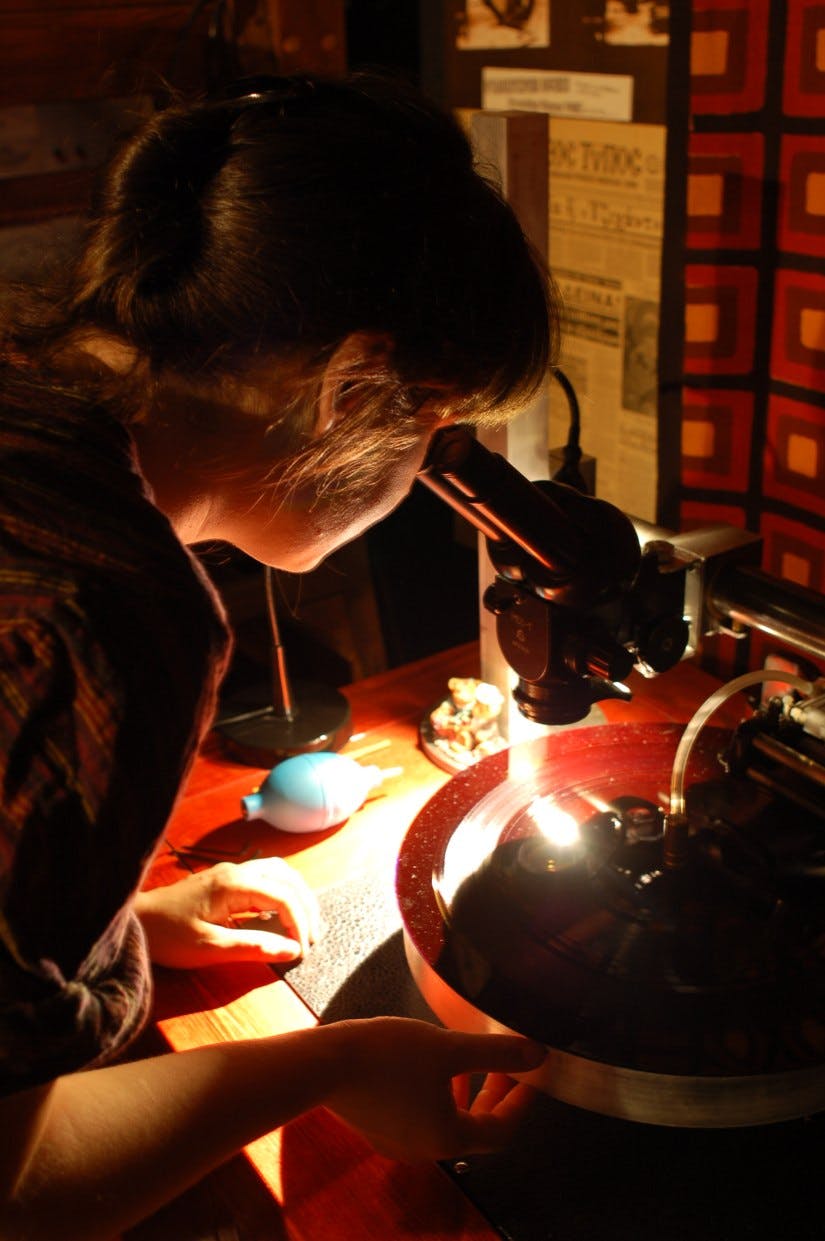
I was always around musicians and artists, so somehow this seemed just natural for me. Then I met J. I. who had already designed and constructed 8 studio facilities and was talking about starting one dedicated to high end analog mastering. With inheriting a building in Greece, we saw as an opportunity, just before the economic crisis reached its peak with capital controls, but the need to settle down was strong. We were able to predict the capital controls, so we were not taken by surprise but prepared for it and managed to keep everything going through this difficult time. All of our facilities were moved from the UK to Greece where we built the studio in that building to our specifications and needs, with a lot of help from J. I.’s family. The first few years, we had phases where it was hard to stay motivated, because we both often felt exhausted and not enough money came in. We are also quite into the old-fashioned idea of honest business making, wanting to be fair and taking all the risks ourselves. I think, if you work this way it is common that your living conditions are awful for the first years.
At first, although we were mostly expecting mastering work, we were surprised by the volume of requests coming in for analog recording (!) so, we started offering direct-to-master recording. This lead to realizing that the situation with the availability of parts and spares for our tape machines and disk mastering lathes was getting pretty bad, so we started looking into making the parts we needed. We tried to work with some local machine shops, but it wasn’t working out. These parts are incredibly precise and very difficult to make. This was when we decided that if we wanted to keep this going at a high level of quality, we would need to invest in our own precision machine tools. The demand for parts was rising and it took some time to locate and restore suitable machines.
We started off with a Schaublin 102 lathe we found in Switzerland. We then upgraded to a Lorch precision lathe we got from the Leitz factory in Germany, which made the microscopes fitted to the Neumann disk mastering lathes! We also restored a precision milling machine used for making medical implants and eventually we found and fully restored a Hardinge HLV, one of the most accurate toolroom lathes ever made. Fascinating precision. I remember how after we reassembled the HLV, we put a very accurate 0.001 mm dial indicator on the spindle to measure runout, and there was practically no deflection at all! We are now supplying many of the world’s leading cutting facilities with custom parts and upgrades for their disk mastering systems, or even complete systems, and of course repair and maintenance services.
I think the objective has always been great sounding records, and less wasted resources! Although by the time a new album is ready, we’ve heard it so many times it feels like we’d never want to hear it again, a few months later the urge comes back and it is a deeply satisfying experience, which keeps us motivated, to listen again to what we have achieved, or to receive records our customers have cut with equipment we have built with our own hands, blood, sweat, and tears! What keeps us motivated is the big amount of great feedback we get from our customers and followers. We have a lot of visitors coming to meet us, not only from the USA but lately also from Asia. I love having guests over, and the guests love my handmade pizza!
What is a day in the life like?
Ideally I start my day with a cup of coffee in the garden enjoying the company of our feral cat friends. This is pumping me up with enough energy to check emails and go on until lunch break. I contact suppliers, hunt down data-sheets or standards documents, order parts, correct texts, communicate with customers and trying to keep myself up to date on what’s happening in the industry.
In the afternoon, I usually do more practical work in the lab, studio or workshop. I am making CAD drawings, building/updating websites, doing audio editing and CD authoring, assisting J. I. in the mastering room or machine shop, wood working, metal working, packing, unpacking, sending off lacquer masters, tapes or DDP files to manufacturing plants all around the world and coordinate international releases, keeping backups and documentation of our work.
Every day has roughly the same structure but the tasks are very different, since we rarely repeat exactly the same project. It never gets boring, sometimes I even wish for a bit less excitement and more routine, haha! In the evening, we sometimes listen to a record just for pleasure to wind down.
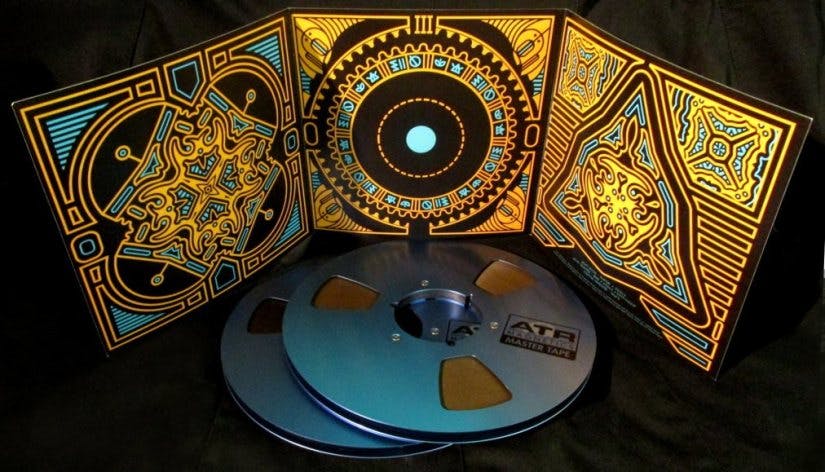
What has been your favorite / the coolest thing you’ve worked on?
When Naxatras recorded their first album, which became a worldwide success, they were missing an organ player for their direct-to-master recording. So, they asked me to jump in for that. I was sweating blood, trying to grab the tunes just right, watching the drummer give me signs. After a couple of takes, the song came out wonderful and became the fans favorite song of that album, it is called “Waves”. I liked it so much, I made an amateur music video for it. When I have some creative inspiration, I simply have to make it happen, so I dug my head into basic video editing in my free time. Naxatras is a phenomenon of a success story for an independent Greek band, which would deserve its own scientific study. We are working close together with them in many ways, and I am proud of us all for what we have organically and ethically achieved. We picked up from the first few songs that Naxatras played in the studio, that this had great potential (“talent-alarm” ringing!), although these youngsters greatly underestimated their own abilities (like usual in Greece), and we encouraged the boys to take it further, taking a lot of time in briefing and teaching them about how the music business works.
Unfortunately, we didn’t have the funds to sign them to our own label back then, otherwise we would have certainly done it. Our Reel-to-Reel release of Naxatras III , together with the triple vinyl record, which was cut at Magnetic Fidelity, recently won the Rocky Mountain International Hi-Fi Press Award 2019, at the Rocky Mountain Audio Fest in Denver, CO, in the category “Best Audiophile Recording”. The reel-to-reel release was my project and a big challenge here was finding the right suppliers for artwork and fancy packaging that would complement the high quality format. The box was handcrafted by a local carpenter, who is super busy making luxury audio equipment furniture and was making these whenever he had some time in between for us, so that took quite a bit of persistence and patience to get our hands on them!
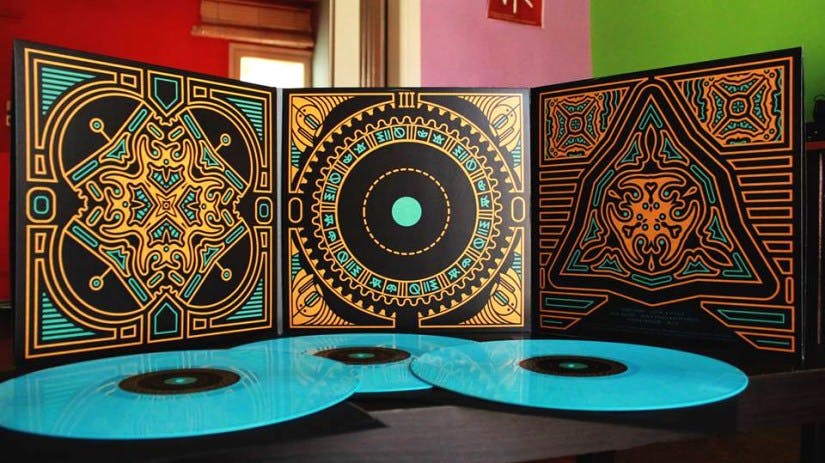
What has been / is the most difficult part of your job?
Lack of confidence in combination with a self-sabotaging stubbornness is a big issue with other people in Greece, the first especially among women. Great talent is hiding here, amazing musicians and creative minds, who cannot imagine taking all this on a more serious level. Many people think that great things can only come out of the USA, England, Switzerland or Germany! Many couldn’t believe that a Greek production could win a highly regarded international award for sound quality. Greece has far more to offer than amazing food and brilliant beaches. Watch the multiple award-winning documentary “The Greek Rock Revolution” to look further into what I am talking about! Greece went from having seven record pressing plants at one time, to not even having a single one at the moment, despite the global resurgence of the medium and a booming local market.
What advice do you have for someone wanting to get into pursuing what you’re doing?
For what I do you would need an irresistible urge to learn persistently in a self directed manner, know how to grab pieces of information from here and there, and learning by doing. I was already versatile in using Linux based systems and exploring programs myself that I needed later, for example programs for type setting, CAD, audio editing, website development, basic coding, accounting etc.
I come from a DIY background, both through my upbringing and the social environment of the GDR, where scarcity made people rely mostly on their own means; but also through my mum, who repeated “Selbst ist die Frau!”, which means, that a woman should be able to rely on herself rather than expecting men to be stronger and run to the rescue.
As a teenager and young adult I was active in punk and alternative scenes, where non-commercial projects of all kinds were demanding self-organization and skill sharing was a big part of our activities. I even learned some basic welding and simple electronics repairs, which occasionally come in handy. You need to keep in mind that we are located in a country that is experiencing a horrible financial crisis (Greece). We have to rely a lot on our own means, because many services and goods are simply not available here, that you would totally take for granted in England or the USA. If you are from a less privileged country, you need to be aware that you will have to work many times harder than others, and that you will not only have to deal with sexism, but also be directly and indirectly confronted with racism/nationalism. Something that often happens, which I find almost too mind-numbing to get appropriately angry about when I hear it, is when discriminated groups make discriminating comments about themselves, woman against woman, southern Europeans against southern Europeans. Stop doing that and instead appreciate other people’s great ideas and efforts! It happens that customers, who call us, ask: “Who is this guy Sabine?” (In Greek, there is no gender neutral way to ask this question). They automatically assume I am male because they do not see enough women in this field to even consider me being female. I am taking this with humor and make fun of them, hehe.
If you want to get into record cutting or mastering lacquer disks, you’d better have a separate reliable funding source for the first years since this requires expensive and still rare to find equipment. Learning the art and science is usually transferred directly from engineer to engineer, there are almost no books available on that topic. A solid background in audio engineering, and some experience with electronics and mechanical engineering will speed things up dramatically. At Agnew Analog, we also offer teaching and training sessions for disk mastering, if you prefer to get some in-depth knowledge of the secrets of disk cutting rather quick than little by little. Whatever machine you are able to use for cutting records, try to use them to their full potential. We also started with simple means, but you can get awesome results if you learn how to get the best out of even simple equipment. This applies actually to any kind of technical equipment, not just record lathes. As soon as you get out the full potential, and you realize you want to go further than the ability of this machine allows, then it’s time to upgrade, not because you get bored with trying hard to get good results and failing.
A survival tip: Choose your business partners wisely!
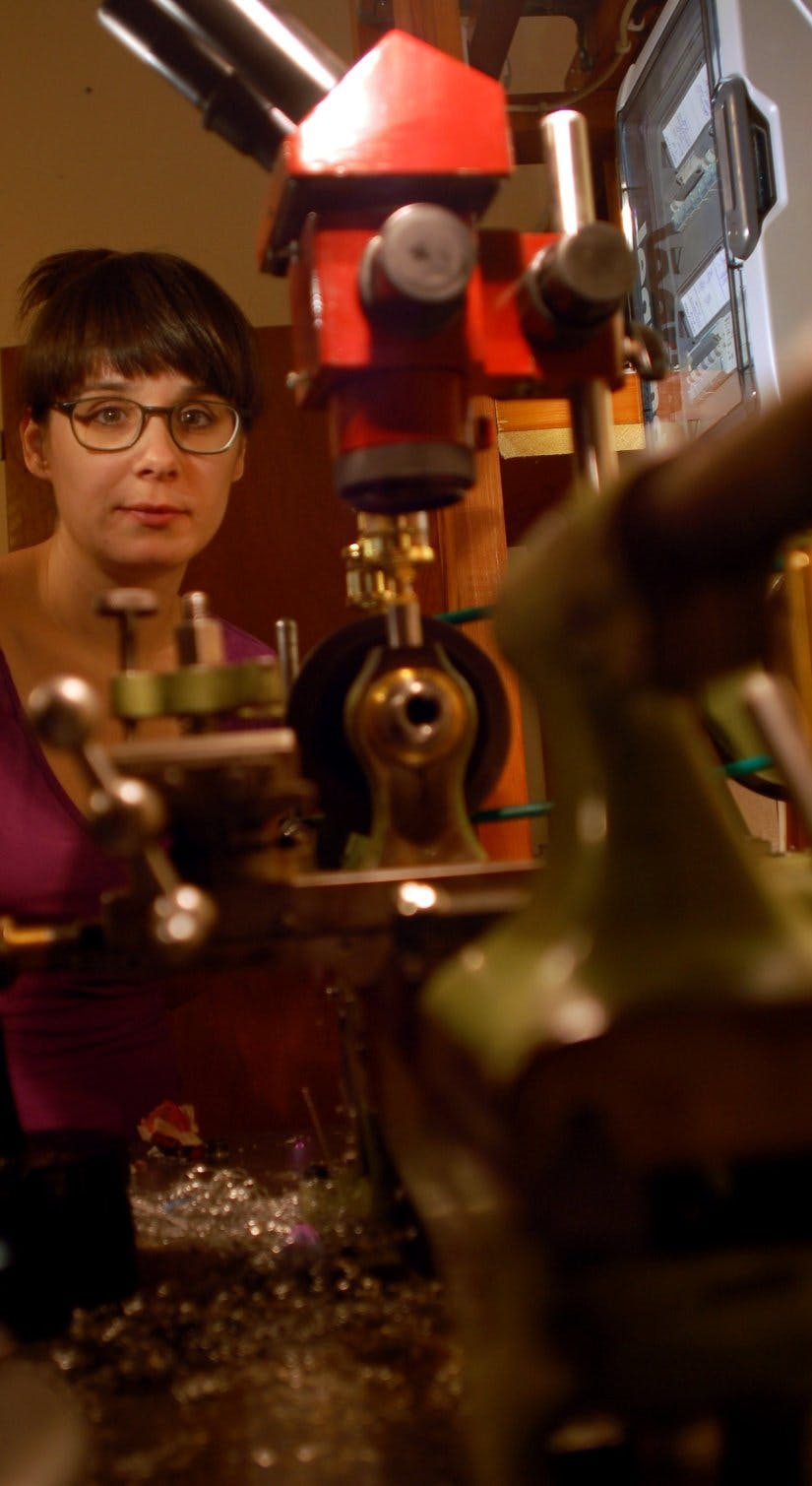
Are you a vinyl collector yourself? What drew you to it?
Yes. My parents had a turntable when I was small, and years later I found a German child piece that we used to listen to (“Tabalugas Reise zur Vernunft” by Peter Maffay), in a record store in Thessaloniki! As a 10 year old I was already figuring out on how to fix my cassette tape recorder myself. I recorded music from the radio and envied the kids who had MTV at home. I got already really annoyed back then with cheap badly made audio equipment, because my beloved walkman would break every few months! Don’t get me started on MP3 players, those are even worse. After drooling over my friend’s turntable, he gave me an old GDR stereo system as a birthday present! Far from audiophile but at least something to listen to records. Since then, I have a steadily growing record collection, kept separate from my husband’s records. I made some pretty special finds at the time nobody seemed interested anymore in this medium, around the year 2000. Unfortunately, someone who took advantage of my hospitality stole half of my collection, and I am still missing these records a lot! I am not into streaming or digital hoarding of songs at all, too many songs you never listen to. I like the “filter” effect vinyl records demand, since I cannot buy 1000 different records in one go, and have to decide which one is worth spending on. How often have I been in a record store having to decide between two records because I could not afford both… a tragedy!
What types of things are happening in your industry / with vinyl that you’re excited or worried about? i.e. innovation, or trends you’re seeing.
I see more people getting into record cutting who we call “the hobbyists”. They are often either retired people that cut records out of nostalgia, or young people who get into this mostly through DJing, without much intention of doing it commercially. There is a lot of innovation, creativity and enthusiasm going on, and some of them even manage to make an income offering the so called “lathe cut” records, which can satisfy the market gap for small runs of 1-50 records. These lathe cut records can sound astonishingly decent, but they are a completely different world to what happens in professional lacquer mastering, plating and pressing facilities, for runs of several thousand records.
I am worried about the decrease of acceptable quality in record production and the loss of expertise on how to make good records, which results in a waste of resources and can lead to the eventual decline of this medium. Unrealistic technology is being hyped up into space as an investment bubble, just to get some quick money out of high risk investment for questionable products. Some new products in this field seem to be more about marketing and not about in-depth knowledge of the medium. Call me Cassandra if you like, I don’t share the enthusiasm for that stuff. I also see a trend towards democratization of vinyl record manufacturing, in the sense of record production being accessible for almost anyone nowadays, and not just qualified professionals, but I am sad that this often leads to piles of unsold unlistenable records that one day will be recycled into floors, because many people simply have no idea how records are made properly, but they still try to do it anyway!
We have to constantly educate artists, enthusiasts and small record label owners with no technical background whatsoever. There is a huge knowledge gap and it is a real challenge to make a non-technical person understand the process through 10 minutes on the phone or some emails. That’s where our idea of offering Teaching and Training originally came from. We certainly see room for technological improvement, and I am proud to have my partner J. I. for that, who is a genius inventor and problem-solver, a real asset for us! Of course, there are many companies and individuals doing a great job in making records and are even constantly improving. You need to do some effort to find them, though.
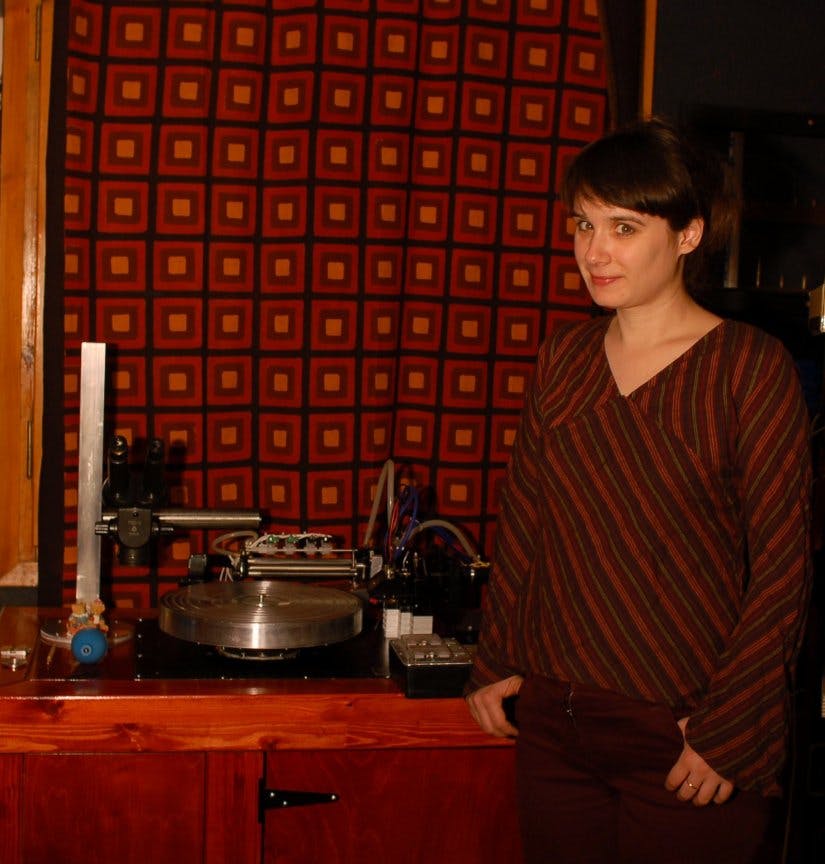
Tell me more about what you’re listening to right now:
Although I was already a deep listener from teenage times on, through working in this studio I definitely developed an audiophile taste in music and I enjoy music from many eras, locations, traditions, and genres. I cringe over recordings with distortions and sharp sibilants, muddy or too aggressive bass and muffled highs. Music that sounds like a shiny mass produced plastic toy without any real emotions, forcing primitive reflexes cannot excite me. I believe I can hear the difference between marketing tricks and art. When I hear a skilled singer in a well-made recording I feel a pleasant tickling down my spine. This can happen with any genre, as long as it is made with some effort and the singer is all there from the depth of the heart. A well-placed smooth cello sound can take my breath and make me feel like in a warm bubble underwater or back in my mothers belly. When it stops I gasp for air….
Some dancy psychedelic rock like the music of Naxatras or electronic beats move my feet and wiggle my finger tips, send me to the moon and back. Music is a whole body experience for me, it can be very intimate and I enjoy it a lot like that. One of my favorite recordings from a local band is called “Lunar MGC – Planet Geisha”, they unfortunately disbanded, but their music will stay! It is instrumental psychedelic rock of the dreamy type.
Find Sabine:
Instagram: @agnew_analog
Facebook:
Sabine: @sabine.steldinger
Agnew Analog: @AgnewAnalog
Magnetic Fidelity: @magneticfidelity
Blog: www.agnewanalog.com/blog/
Websites:
Magnetic Fidelity: www.magneticfidelity.com
Audio technology: www.agnewanalog.com
We hope you enjoyed this content! If so inclined please donate so we can continue bringing you more like this. There is no amount too small.

